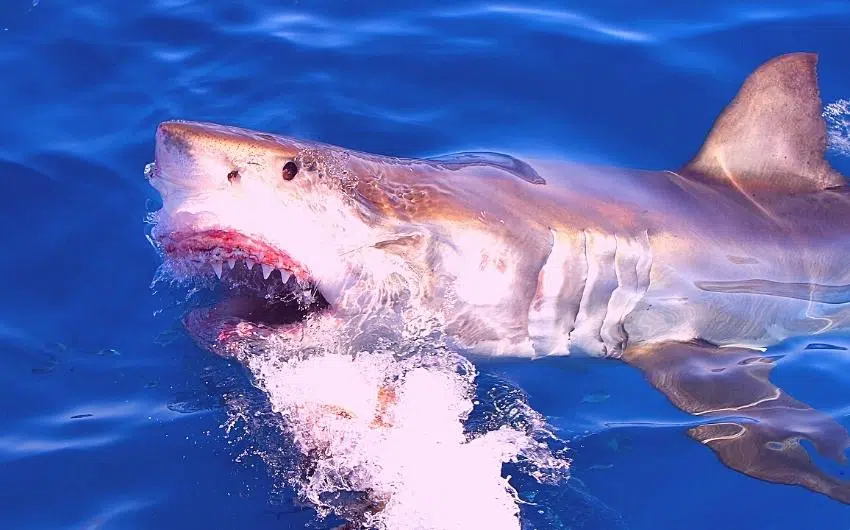If you’re a fisherman or have ever been on an ocean cruise, there’s always the possibility that you could accidentally catch a shark.
This can be scary and dangerous. Sharks are unpredictable animals to deal with, but they have also protected species in many world areas.
So what do you do in this situation if it happens?
We have all the information you need! Learn how to handle sharks safely by reading our blog post about what to do if you accidentally catch one!

Quick Jump
ToggleWhat do you do if you accidentally catch a great white shark?
Great white sharks are a species that is protected in many parts of the world, so you have to be very careful when dealing with one. Here are the most important seven tips you must keep in mind:
- Retrieve your fishing gear as quickly as possible. The longer the shark is attached to your line, the more likely you will do serious damage.
- Keep the shark in the water at all times. Great white sharks are very heavy, so they could easily crush you. Please keep them in the water!
- Allow the shark to rest for several minutes before trying to remove the hook.
- If the shark is tired, you can attempt to remove the hook yourself. If it’s not too exhausting, use a net to scoop it up and remove the hook.
- Suppose the shark is exhausted; attempt to bring it onto your boat using a rope or gaff. If you’re using a gaff, make sure to avoid the shark’s dorsal fin.
- If the shark is still alive after removing the hook, release it as soon as possible. If you cannot safely return the fish to the water, cut the fishing line and let it go free.
- If you want to continue fishing, do not replace the same bait used on the shark. The scent will attract other sharks. Instead, try using a different bait.
Remember, if you’re fishing in an area that has sharks, it’s best to avoid them at all costs. Not only is it dangerous to deal with sharks, but you could also get into serious legal trouble if you accidentally catch a protected species.
What happens if you catch a shark?

First of all, catching a shark is terrible for the shark. Sharks are protected in many parts of the world because they are an important part of the ocean’s food chain.
Because of this, accidentally catching a shark can get you into serious legal trouble if it’s a protected species.
If you happen to catch a shark, immediately post release it from your line and throw it back. If the animal is in good condition, return it gently with its headfirst into the water so that all may swim freely again.”
In addition, catching a shark is extremely dangerous for the fisherman. Sharks are very large and heavy animals that can easily crush you or your equipment if they get close.
How can you avoid catching sharks?
The best way to avoid accidentally catching a shark is to stay away from areas known to have sharks.
If you absolutely must fish in an area with sharks, it’s best to look into shark repellent, which is available on Amazon.
That being said, it’s possible to catch a shark by accident. If this happens, remember our tips for how to handle sharks.
Do sharks survive catch and release?
Fishers often think that they are not harming sharks because of this practice, but it does harm them.
Biologists have evidence to prove catch-and-release is harmful to both fisherman and sharks alike; after catching one, you should always make sure the animal isn’t suffering before releasing him back into his natural environment where he belongs!
How to remove a hook from a shark?
If you come across a throat hooked fish, do not try and remove the hook yourself! The damage doing this will cause bad enough.
To avoid hurting them even worse, cut off as much line close to your fishing spot with an appropriate cutting tool or knife if possible – gut hooks can make for some tough work in getting rid of those pesky things once they’ve been swallowed by these predators though so be careful when handling their catch afterwords.
Can a shark survive with a hook in its mouth?
Some species of shark can live years with a hook in their mouth. However, they often grow infections and deformities due to this, decreasing their chances of survival.
If you come across a fish with a hook in its mouth, you should go ahead and cut off most of the line close to the water and then release it back into the ocean.
Make sure you are careful when doing this, though. Not only is it dangerous for yourself, but it could also be dangerous for the shark because it could bite you in self-defense!
How do you release a shark that’s caught?
Although releasing a shark is typically the best option, you should be extremely careful when doing so. You don’t want to injure yourself or the animal when doing this because it could get very ugly, very fast.
Avoid the shark’s head when releasing it if at all possible, and always remember to cut off as much fishing line close to the water as you can before doing so.
Are all sharks dangerous?
No, not at all! Most sharks are completely harmless to humans. The only three species of shark that you need to worry about are great whites, tiger sharks, and bull sharks.
These three species are known to become aggressive when they feel threatened by a human.
Can you keep a shark after catching it?
You cannot keep a shark that you catch by accident, but it can be measured or tagged if there are special permits in your area.
Along with many other countries in the world, it has strict hunting laws that prohibit people from engaging in certain activities related to sharks.
For example, it’s illegal for anyone under U.S. jurisdiction (including American citizens)to finning these animals or catch them so that you can have their fins without having any corresponding carcass on your boat.
How to unhook shark surf fishing?
If you are going surf fishing, there is a special technique to unhook the shark. Due to their sharp teeth, you should try and grip the lower jaw while working the hook out of the mouth and pulling simultaneously.
To remove a hook from an animal’s mouth, flatten it with pliers or use a hook remover.
If your catch has swallowed its own baited line and you want to get rid of the weapon before releasing back into its natural habitat, then do not attempt pulling it out – this may cause serious internal damage that could compromise the survival rate for both human beings/animal alike.
Hook remover for sharks
The best way to prevent getting bitten by sharks is to remove their hooks, but most people don’t know how dangerous this can be!
Luckily, there’s HookRemoverForSharks™ – the first line of defense against shark bites while removing fishing hooks from their mouths.
This product has been used for years as an alternative solution for those who want to avoid being injured or killed when removing a hook from a live shark mouth.
How to release a shark from the beach?
First of all, ensure that the shark is not in any pain. If it’s still alive and you want to release it back into the ocean.
If you are lucky enough to spot a snapper, hold on tight! When this fish starts showing signs of life and diving back into the water with its prey in tow – do not let go.
Use your hands as traction against its body while slowly moving back towards land (using palms facing away from yourself) until reaching tail where there should be some switch or fin that can give it an electric shock if needed for release purposes.
Commonly Asked Questions about catching Sharks (FAQ)
Is shark hunting illegal in the U.S.?
No, not all shark hunting is illegal in the U.S. Some states such as Florida and Hawaii have regulations against killing certain species of sharks, though.
What sharks are illegal to keep?
There are many types of sharks that you cannot keep as pets. Some common prohibited species include the Atlantic angel, basking, bigeye sixgill and thresher fish (Alopias vulpinus), bignose jack or black nose shark(Carcharhinus Altimus) – these three have been recorded from Florida waters, for instance; Caribbean reef/ sharpnosed rhizoprionodon porous type IIIA+ which is found around Cuba but not likely in U.S. waters.
Is it OK to leave the hook in shark’s mouth?
While sharks have been known to bite humans, most of the time, they’ll swim away after being hooked. However, in rare cases, a fishing hook can get lodged in the side of a shark. If this happens, they might need human assistance to get it out.
Is it illegal to kill a shark?
If you kill a helpless shark, then yes, it is illegal. You cannot kill any of them just for “sport” or to catch their fins.
How to take a hook out of a shark’s mouth?
Removal of the hook from the mouth of a shark is likely to be difficult, time-consuming, and even dangerous. You should take this very seriously. Never attempt this if you do not have any prior experience. It is important to treat the shark fishing with respect and always release it back into the ocean.
Is it legal to catch and keep sharks?
No, it is illegal to catch and keep a shark. They are wild creatures that cannot be kept in captivity for extended periods.
What sharks are illegal to catch?
There are a bunch of different kinds of sharks that you aren’t allowed to catch. These include the Atlantic angel, basking, and bigeye sand tigers, as well as sixgill or thresher sharks! Plus, there’s bigness for good measure- but beware: if an inspector spots one on your line, then he’ll take away all their gear immediately because they’re illegal in U.S. waters.
Is it illegal to kill tiger sharks?
As of today, tiger sharks are no longer allowed to be harvested in state waters. This is a huge victory for conservationists and marine life enthusiasts everywhere who are traumatically aware of just how common it is for these creatures to be slaughtered.
How often do people get bit by sharks?
Humans are bitten by sharks an average of 5-10 times per year, but most of these bites are not fatal.
Conclusion
If you’ve found yourself in the unfortunate circumstance of catching a shark, it may be tempting to keep them as a pet. In most cases, this is not an option, and releasing them back into their natural environment should be your priority. Remove the hook from its mouth with care, so you don’t injure it before release. Once free from any hooks or lines, throw the line back into the water for safety reasons and let nature take over!
You might also like:

